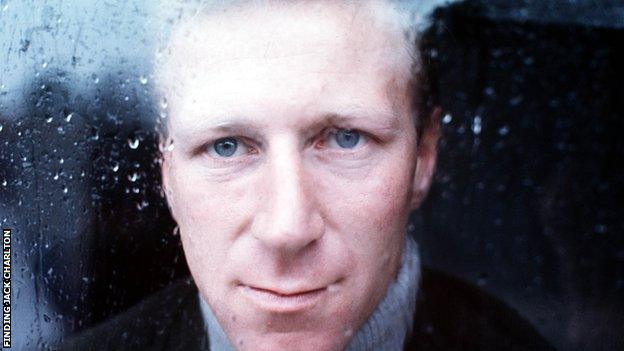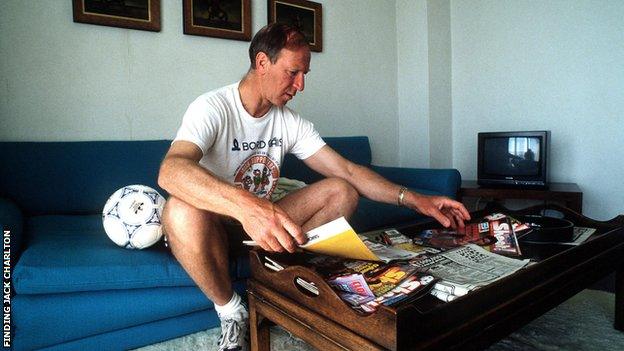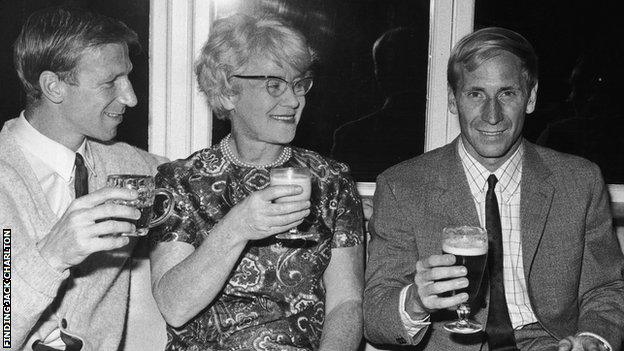Finding Jack Charlton: Five things to look out for
- Published

Finding Jack Charlton airs on BBC Two on Monday at 21:00 BST
A World Cup winner with England, a World Cup hero with the Republic of Ireland, and possibly the only man Pope John Paul II called "boss".
Jack Charlton packed a lot into his 85 years, and the story of his amazing life is told in Finding Jack Charlton, which airs on BBC Two on Monday, 29 March - and will then be available on BBC iPlayer.
As well as charting his career in football, the feature-length documentary - filmed during the last 18 months of his life - also gives an emotional insight into the effect dementia had on Charlton.
Here are five things to look out for.
He brought hope to Ireland
The main takeaway from the film is just how much Charlton was loved in Ireland.
The Englishman spent a decade managing the Republic, leading them to their first major finals - the 1988 European Championship - and the World Cup quarter-finals at Italia '90.
In the film, U2 drummer Larry Mullen Jr talks of Republic of Ireland fans reclaiming their country's flag, which he believed had become associated with politically motivated violence.
"We took that flag back and flew it with pride," he says. "Jack Charlton did that."
Writer Roddy Doyle believes Italia '90 brought a shift in how Irish people perceived themselves, and comedian Brendan O'Carroll says: "We had won the right to take our place as a nation."

Charlton was Republic of Ireland manager from 1986 to 1995
His relationship with his brother Bobby
When England won the World Cup in 1966, the squad included two Charltons - Jack, who spent his entire playing career at Leeds United, and his younger brother Bobby.
In a recording shown in the film, Jack describes his role when they were growing up.
"I had to look after him during the day and make sure he was OK," he says.
"I didn't like it. I liked the sea, I liked the countryside and Bobby didn't. He liked to be around my mother, he liked to be at home.
"I could have done more things without him than I had to do with him."

Jack and Bobby - who was knighted in 1994 - flank their mother Cissie.
Another recording gives Charlton Jr's perspective.
"My brother was an uncompromising character," says Bobby, who made 758 appearances for Manchester United.
"I watched him in a derby match - he gave a goal away and they lost. I said to him after: 'You were stupid giving that daft goal away.' He punched me straight off the back of the couch on to the floor."
The film paints a picture of what is a complicated relationship between two hugely successful football brothers.
He stuck by his players in hard times
Paul McGrath was one of Charlton's talismen in the Republic of Ireland team - making 83 appearances for his country between 1985 and 1997.
McGrath grew up in an orphanage in Dublin because his mother had been afraid to take a black child back home to her father.
Football was his way out, but his tough upbringing took its toll and he sought solace in alcohol.
"I could actually have a couple and still try to play," he says. "But a couple then turns into ... you can't tie your own bootlaces, or you have to have a drink from the physio."
McGrath describes not being able to get off the team bus before one game. Charlton later went to his room to find him shivering and shaking underneath the bed.
McGrath says: "He puts his arm around me and says: 'Sorry son, I didn't realise how bad you had it.' He stuck with me."
He left notes everywhere
One of the most charming things we learn in the film is that Charlton made hundreds of little notes, with observations and insights on games, tactics and players.
His family have kept them all - handwritten thoughts on tatty bits of paper, with shopping lists crossed out on them.
"Do not let them settle," one reads. "The ball played long behind the opposite full-backs caused a lot of problems for the East Germans."
Others are even more economical: "Irish job. Famous brother. Nobby Stiles."
How dementia robbed him of his memories
Given the obvious strength of feeling for Charlton, there is no doubt about the most emotional moment of the film.
Charlton's wife Pat says to him: "They love you don't they, the Irish?" He replies: "I don't know, do they?"
In other scenes, he watches World Cup games barely able to perceive he was part of them, and struggles with his balance.
"He's got more emotional as he's got older, because he can't do what he wants to do," says Pat.
Finding Jack Charlton will be shown on BBC Two, on Monday, 29 March at 21:00 BST, before being made available to watch on iPlayer.